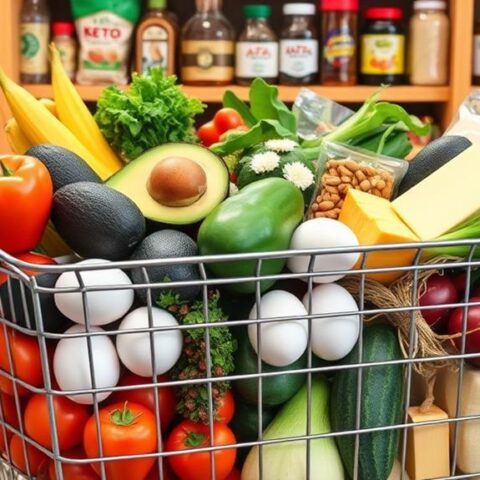
When determining if seaweed salad fits a ketogenic diet, it's essential to focus on its net carbohydrate content, quality ingredients, and nutrient profile. With approximately 4.95g of net carbs per 100g, seaweed salad can be keto-friendly in moderation. It is rich in essential vitamins and minerals such as iodine, calcium, and magnesium. Where possible, opt for organic seaweed to limit exposure to harmful additives. Check for high-carb additions like sweeteners or starchy vegetables that can disrupt ketosis. Pairing it with healthy fats enhances compatibility, ensuring adherence to keto principles. To explore further integration strategies, one might consider ingredient selection and preparation techniques.
Key Takeaways
- Ensure seaweed salad contains approximately 4.95g of net carbs per 100g serving to fit keto guidelines.
- Check for added sugars in soy sauce or rice vinegar to avoid excess carbs.
- Include healthy fats like avocado or olive oil to enhance keto compatibility.
- Monitor portion sizes to maintain daily carb limits of 20g to 30g on keto.
- Avoid high-carb ingredients like starchy vegetables to ensure keto adherence.
Understanding Seaweed Salad
Seaweed salad, a popular dish in various cuisines, is particularly remarkable for its nutritional composition which aligns well with the principles of a ketogenic diet. The primary ingredient, seaweed, is especially low in carbs, boasting only 4.95g of net carbs per 100g serving, rendering it suitable for those adhering to a ketogenic lifestyle.
This favorable carb content is complemented by an impressive array of essential vitamins and minerals, much like the nutrient-rich seafood included in keto diets. Seaweed is rich in iodine, calcium, and magnesium, nutrients crucial for maintaining metabolic functions and bone health.
In addition to being low in net carbs, seaweed salad provides dietary fiber, contributing to digestive health and satiety, a key consideration in maintaining a balanced ketogenic nutritional profile. Moreover, the salad is low in calories, which supports weight management objectives typically associated with a ketogenic lifestyle.
While seaweed itself is not a source of healthy fats, it can be paired with nutrient-dense ingredients like avocado or olive oil-based dressings to enhance its fat content, aligning it more closely with keto macronutrient ratios. However, attention must be given to added ingredients, as they can impact the overall carb content.
Evaluating Carb Content
In examining the keto compatibility of seaweed salad, a vital focus lies on its carbohydrate content. Seaweed salad presents itself as a favorable option for keto diets, providing approximately 4.95g of net carbs per 100g serving. This low carbohydrate content aligns well with the strict carb limit of keto diets, typically ranging from 20g to 30g daily, allowing for a keto-friendly meal.
The carbohydrate profile of seaweed salad is further enhanced by its dietary fiber, which helps reduce the net carbs, thereby diminishing the overall glycemic impact. Additionally, the dietary fiber in seaweed salad can aid in stabilizing blood glucose levels, a benefit particularly advantageous for those managing type 2 diabetes.
When considering seaweed salad for keto diets, it is essential to account for the potential influence of added ingredients. Sweeteners or starchy vegetables can greatly increase the total carbohydrate content, potentially disrupting ketosis.
- Net carbs of 0.83g per 10g serving support keto regimens.
- Dietary fiber mitigates the glycemic impact of carbohydrates.
- Added ingredients may raise the carb content beyond keto limits.
To maintain seaweed salad as a keto-friendly meal, monitoring portion sizes is important. Despite its low net carbs, larger portions can inadvertently surpass the carbohydrate threshold vital for maintaining ketosis, thereby necessitating careful consideration of serving sizes and accompanying healthy fats.
Assessing Ingredient Quality
When determining the quality of ingredients in seaweed salad, prioritizing low net carb options is vital for adherence to ketogenic dietary standards. Seaweed itself is a nutrient-dense, low-carb food, featuring approximately 0.83 grams of net carbs per 10 grams, which makes it inherently compatible with the keto diet.
However, the assessment of ingredient quality extends beyond the primary component. It involves scrutinizing additional ingredients that may accompany the seaweed. For instance, starchy vegetables like potatoes or corn are high in carbs and should be avoided in the salad. Soy sauce and rice vinegar are common additions but must be evaluated for added sugars or non-keto sweeteners, which could potentially increase the carbohydrate content and compromise the salad's nutritional profile.
Opting for organic seaweed is advisable, as it minimizes exposure to harmful additives and pesticides, enhancing the health benefits associated with a keto diet.
Moreover, attention should be paid to dressings and toppings, ensuring they do not contain high-carb ingredients or refined oils that detract from the seaweed salad's healthiness. The overall nutritional profile of the salad can vary greatly due to cooking methods and added ingredients.
As a result, reviewing labels or recipes for accurate carb counts is imperative for maintaining keto compliance.
Seaweed Salad Nutrition
With its nutrient-rich profile, seaweed salad emerges as a favorable option for those adhering to a ketogenic diet. Characterized by low carbohydrate content, seaweed salad contains approximately 4.6g of net carbs per cup. The primary ingredient, seaweed, contributes a mere 0.83g of net carbs per 10g serving, aligning seamlessly with keto dietary restrictions. This low net carb count makes seaweed salad an attractive choice for those seeking low-carb options within Japanese cuisine.
Furthermore, seaweed provides essential amino acids that are essential for muscle maintenance and overall health, supporting the body's protein synthesis needs while on ketosis. Seaweed salad is not only low in net carbs but also provides a healthy dose of essential nutrients. It's an excellent source of vitamins and minerals, including Vitamin K, which is critical for bone health and blood coagulation. Additionally, it supplies iodine, calcium, and magnesium, contributing to overall metabolic function and bone density.
The calories per serving are modest, generally ranging from 30 to 50, allowing for mindful consumption without compromising the keto protocol. The fiber content in seaweed salad enhances digestive health, supporting gut microbiota balance fundamental for overall well-being. This fiber aids in maintaining a low carb intake while promoting satiety.
To summarize, seaweed salad offers:
- Low net carbs suitable for keto
- Essential nutrients like Vitamin K and iodine
- Digestive benefits from fiber content
Keto-Friendly Seaweed Recipes
Seaweed salad's low net carb content and nutrient density make it a staple for ketogenic diets, prompting interest in crafting keto-friendly recipes that maximize flavor without compromising dietary goals.
A basic keto-friendly seaweed salad incorporates rehydrated wakame, soy sauce, rice vinegar, and sesame oil, a combination that guarantees minimal carbs while maintaining a robust flavor profile. This salad serves as a nutritional powerhouse, delivering essential vitamins and minerals with a focus on healthy fats from sesame oil.
Incorporating avocados into the salad can boost the dish's monounsaturated fat content, promoting heart health and adding creamy texture. Additionally, the inclusion of non-starchy vegetables like cucumber and radishes contributes texture without greatly elevating the net carb count. For moderate protein intake, shrimp or crab can be added to salads, complementing the seaweed's umami flavor while adhering to keto guidelines. Maintaining a mindful serving size of approximately 113 grams (1 cup) is vital, as it aligns with daily net carb restrictions.
Moreover, experimenting with dressings such as miso or flavorful additions like sriracha can diversify the salad's palate, allowing for a personalized taste experience without deviating from a low-carb framework.
This strategic approach to seaweed salad guarantees it remains both a dietary and culinary asset.
Frequently Asked Questions
Can I Eat Seaweed Salad on Keto?
Seaweed salad can be included in a keto diet due to its low carb content and substantial seaweed benefits. Emphasizing fiber content and nutritional value, it supports meal prep and dietary restrictions, with portion control and healthy fats.
Does Seaweed Salad Have a Lot of Sugar?
Seaweed salad generally exhibits low sugar content, with its nutrient density offering notable health benefits. Seaweed nutrition includes dietary fiber and low calorie count. However, ingredient variations and preparation methods may alter sugar levels and flavor profiles.
How Much Seaweed Salad Can I Eat?
Determining how much seaweed salad to consume involves evaluating nutritional benefits, portion sizes, and dietary restrictions. Consider ingredient variations, taste preferences, and health considerations in meal planning. Serving suggestions and cooking methods offer diverse recipe ideas for balanced consumption.
Can You Eat Nori on Keto?
Nori is an excellent option for keto diets due to its low carb content and rich nori nutrition profile. It serves as a versatile ingredient in keto snacks, sushi rolls, vegetarian options, and snack alternatives, enhancing diet variety.
Conclusion
In summary, determining the compatibility of seaweed salad with a ketogenic diet requires careful evaluation of its carbohydrate content, ingredient quality, and overall nutritional profile. Seaweed, being low in carbohydrates, can align with keto principles if prepared with minimal sugar-laden additives. Analyzing the nutritional composition, including fiber and micronutrients, further supports its potential keto suitability. Crafting recipes with keto-friendly ingredients guarantees adherence to dietary goals while leveraging the health benefits inherent in seaweed's nutrient-rich profile.










No Comments